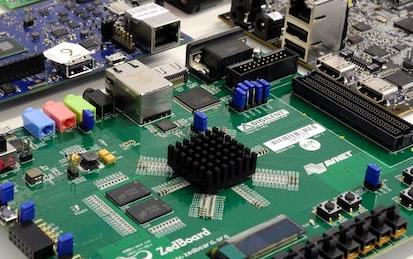

Our Courses

Introduction to Enterprise Computing
Large Scale Enterprise Computing powers all major transactions, and the Mainframe is responsible for 87% of all credit card transactions and enables 71% of all Fortune 500 companies. Mainframes are fundamental on how we do business, and IBM Z is the only production mainframe sold today. Virtually everyone depends on it. This is your introduction to the hardware, operating systems, security, and features that make this possible. On successful completion of this course, learners are eligible to earn their Introduction to Enterprise Computing badge.
-
Course by

-
 Self Paced
Self Paced
-
 10 hours
10 hours
-
 English
English

Operating Systems and You: Becoming a Power User
In this course -- through a combination of video lectures, demonstrations, and hands-on practice -- you’ll learn about the main components of an operating system and how to perform critical tasks like managing software and users, and configuring hardware.
-
Course by

-
 Self Paced
Self Paced
-
 34 hours
34 hours
-
 English
English
Getting Started with SAS Programming
This course is for users who want to learn how to write SAS programs to access, explore, prepare, and analyze data. It is the entry point to learning SAS programming for data science, machine learning, and artificial intelligence. It is a prerequisite to many other SAS courses. By the end of this course, you will know how to use SAS Studio to write and submit SAS programs that access SAS, Microsoft Excel, and text data.
-
Course by

-
 Self Paced
Self Paced
-
 25 hours
25 hours
-
 English
English

Embedded Hardware and Operating Systems
All about practical programming and creating IoTs applications! In this course, we will talk about two components of a cyber-physical system, namely hardware and operating systems. After completing this course, you will have knowledge of both hardware components and operating systems. You are able to plan and use embedded operating systems in resource-constraint devices for Internet-of-Things (cyber-physical system) applications.
-
Course by

-
 Self Paced
Self Paced
-
 17 hours
17 hours
-
 English
English

Introduction to Hardware and Operating Systems
Get ready to enter the thriving field of Information Technology (IT), with job ready skills! This beginner friendly course provides the core hardware and operating system knowledge needed by anyone new to IT and computer hardware who wants to start a new career in technology, including IT Support, Networking, Cybersecurity, and Software Development. You will first be introduced to computing fundamentals, the four functions of computing, and the benefits of computing.
-
Course by

-
 Self Paced
Self Paced
-
 17 hours
17 hours
-
 English
English

Build Your First Android App (Project-Centered Course)
What you’ll achieve: In this project-centered course*, you’ll design, build, and distribute your own unique application for the Android mobile platform. We’ll provide you with a set of customizable building blocks that you can assemble to create many different types of apps, and that will help you become familiar with many important specificities of Android development. When you complete the project, in addition to having a personalized app that you can use and share, you’ll have the skills and background you need to move on to more advanced coursework in Android development.
-
Course by

-
 Self Paced
Self Paced
-
 22 hours
22 hours
-
 English
English

Cybersecurity Compliance Framework & System Administration
This course gives you the background needed to understand the key cybersecurity compliance and industry standards. This knowledge will be important for you to learn no matter what cybersecurity role you would like to acquire or have within an organization.\n\n You will learn the basic commands for user and server administration as it relates to security. You will need this skill to be able to understand vulnerabilities within your organizations operating systems.\n\nYou will learn the concepts of endpoint security and patch management.
-
Course by

-
 Self Paced
Self Paced
-
 18 hours
18 hours
-
 English
English

The Unix Workbench
Unix forms a foundation that is often very helpful for accomplishing other goals you might have for you and your computer, whether that goal is running a business, writing a book, curing disease, or creating the next great app. The means to these goals are sometimes carried out by writing software. Software can’t be mined out of the ground, nor can software seeds be planted in spring to harvest by autumn. Software isn’t produced in factories on an assembly line. Software is a hand-made, often bespoke good. If a software developer is an artisan, then Unix is their workbench.
-
Course by

-
 Self Paced
Self Paced
-
 19 hours
19 hours
-
 English
English

Enterprise System Management and Security
The world runs on computers. Your watch, your TV, your car. You might be familiar on how to operate each of these. Your home computer you are even more familiar with operating it. But what does it take to really take computer systems to the next level? - The enterprise level. In this course we discuss what makes home computing systems different from enterprise computing systems.
-
Course by

-
 Self Paced
Self Paced
-
 12 hours
12 hours
-
 English
English

Cloud Computing Applications, Part 2: Big Data and Applications in the Cloud
Welcome to the Cloud Computing Applications course, the second part of a two-course series designed to give you a comprehensive view on the world of Cloud Computing and Big Data! In this second course we continue Cloud Computing Applications by exploring how the Cloud opens up data analytics of huge volumes of data that are static or streamed at high velocity and represent an enormous variety of information. Cloud applications and data analytics represent a disruptive change in the ways that society is informed by, and uses information.
-
Course by

-
 Self Paced
Self Paced
-
 20 hours
20 hours
-
 English
English

Industrial IoT Markets and Security
This course can also be taken for academic credit as ECEA 5385, part of CU Boulder’s Master of Science in Electrical Engineering degree. Developing tomorrow's industrial infrastructure is a significant challenge. This course goes beyond the hype of consumer IoT to emphasize a much greater space for potential embedded system applications and growth: The Industrial Internet of Things (IIoT), also known as Industry 4.0. Cisco’s CEO stated: “IoT overall is a $19 Trillion market.
-
Course by

-
 22 hours
22 hours
-
 English
English



